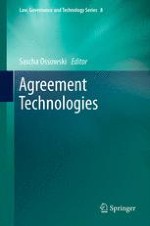2013 | OriginalPaper | Chapter
23. A Socio-cognitive Perspective of Trust
Authors : Joana Urbano, Ana Paula Rocha, Eugénio Oliveira
Published in: Agreement Technologies
Publisher: Springer Netherlands
Activate our intelligent search to find suitable subject content or patents.
Select sections of text to find matching patents with Artificial Intelligence. powered by
Select sections of text to find additional relevant content using AI-assisted search. powered by
